Fenn Cape Point Challenge 2017 – what you need to know
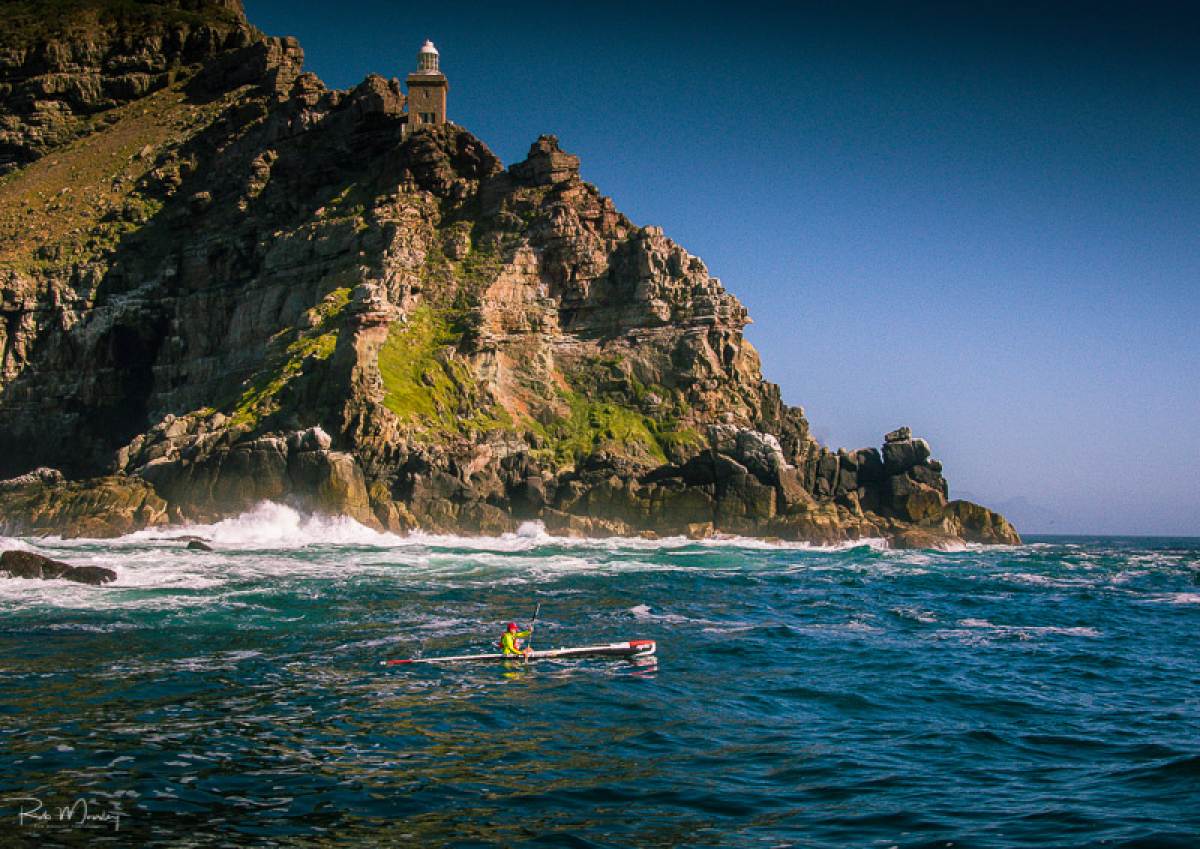 2106 Cape Point Challenge winner Hank McGregor at Cape Point
Credits: Rob Mousley
2106 Cape Point Challenge winner Hank McGregor at Cape Point
Credits: Rob Mousley
Two days out from the race, the weather forecast seems to have settled on a moderate southeaster for Saturday morning, which is good news for the paddlers!
25th Cape Point Challenge
The race is one of the oldest long distance surfski races in the world, having been started in 1980 as an “off-year” companion race to the Port Elizabeth to East London Challenge, a race so extreme (250km in four days) that it’s only run every two years.
Responding to the ever-growing popularity of the Cape Point Challenge, in 2007 the organisers took the decision to run the event every year and 2107 marks the 25th edition of this classic event.
The Route
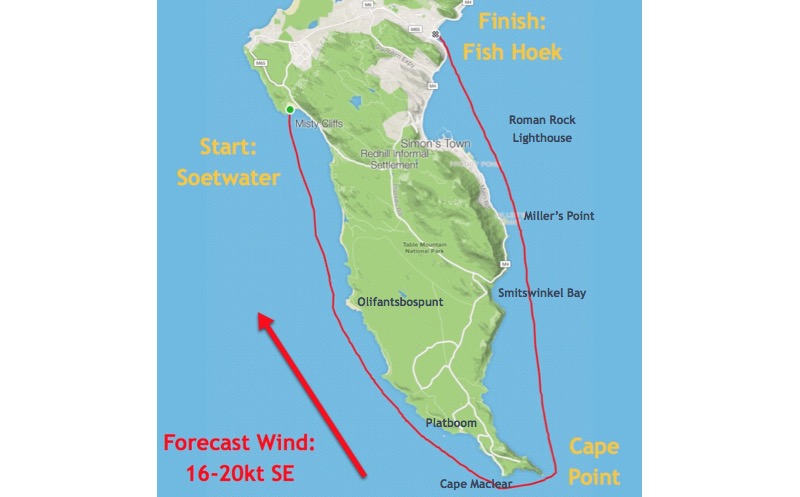
Fenn Cape Point Challenge - the route
Billed as a 50km race, the actual distance can vary somewhat depending on the route the paddlers take around Cape Point.
Soetwater
The start is on the beach at Soetwater, near the old crayfish factory. It’s somewhat sheltered from the SE swell, although some of the paddlers got their hair wet in 2016 going out through the shore break... The first batches head off at about 05h30; the aim of the batching is to maximise safety by having most of the paddlers arrive at Cape Point more or less together.
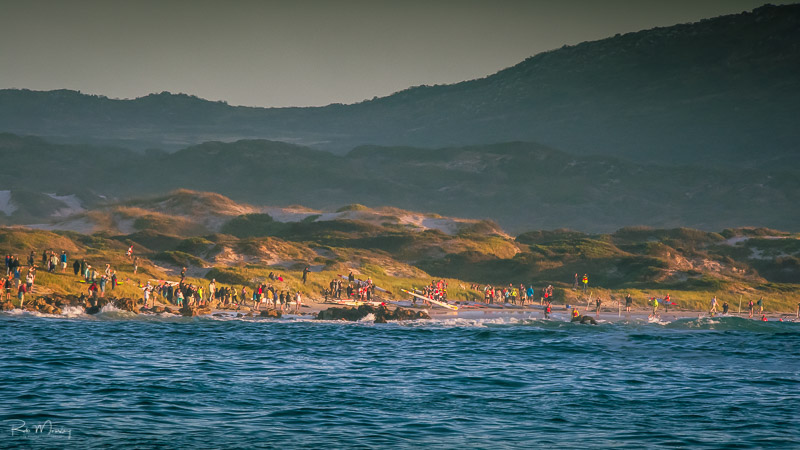
Soetwater - 2016
Olifantsbos
The first landmark is at Olifantsbospunt some 11km from the start, where the wreckage of a WWII steamer (the Thomas L Tucker) can be seen on the beach. Just opposite is a reef that can break at low tide, or when the swell is big. The break can appear out of nowhere and a couple of years ago annihilated a group and smashed a couple of skis. When in doubt, stay out!
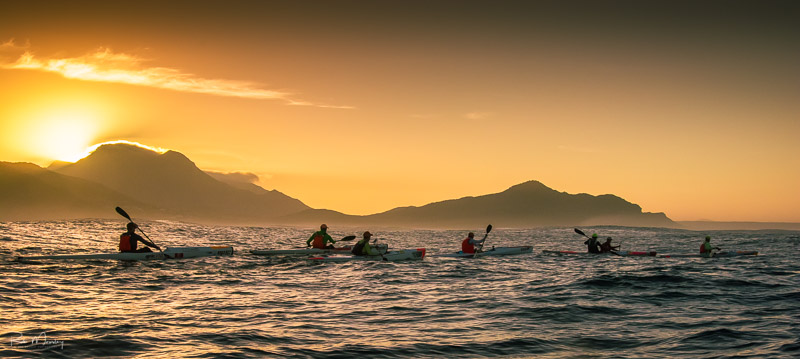
Heading out towards Olifants in the early morning light - 2016
Platboom
Another 10km and you’re opposite the beach at Platboom. This is a potential abort point, although there can be a bit of a break just offshore and care should be taken when coming in.
Kelp Beds
Along this section of the coast there are huge beds of kelp and a vital tactical decision must be made whether to go on the inside, potentially risking time lost when your rudder catches on the mats of weed, or to paddle a longer route on the outside.
Cape of Good Hope and Cape Maclear
By the 25km mark, you’ll be passing the Cape of Good Hope and Cape Maclear with the Diaz Beach just beyond. Things to note in this area:
Depending how far out to sea you are, Cape Point may be hidden behind Cape Maclear. And the first time I did the route, I saw Cape Hangklip (40km further across the other side of False Bay) and thought it was Cape Point – which didn’t do my morale any good at all.
Diaz Beach is very steep and has a very hard shore break – it’s not advisable to try to come in on a surfski.
The section from Cape Maclear to Cape Point is exceptionally rough – the huge Atlantic swells roll in, smash against the sheer cliffs and reflect out to sea again, causing a maelstrom of colliding waves. Truly a testing final 4km before you round the Point!
Cape Point
Around the 27km mark, you’ll be rounding Cape Point. No matter how many times you’ve done it, it’s worth glancing up at the cliffs – half way up, the “new” lighthouse perches on the rocks. It’s the most powerful lighthouse on the South African coast. The “old” lighthouse sits right at the top of the 300m cliffs. And is so often hidden in cloud that it wasn’t a reliable warning – hence the location of the replacement light.
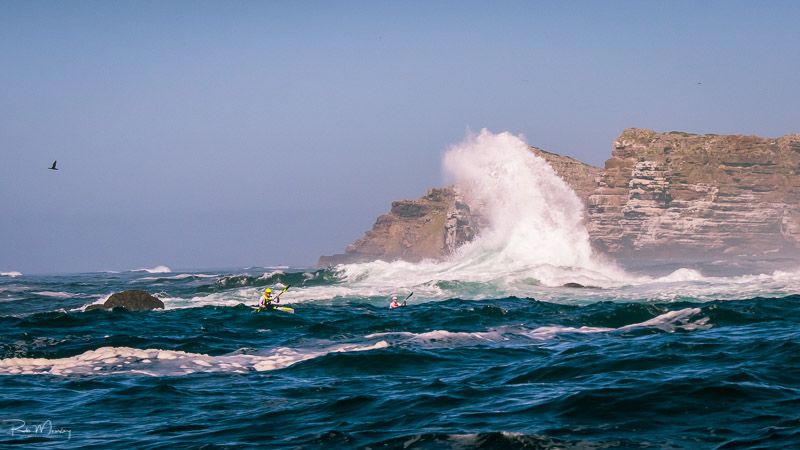
Taking the tiger-line at the Point
The elite paddlers tend to go inside the rock at the point, but take great care in this area; the gap can close out completely and it was here that one of the leaders was capsized and injured when a breaking wave hit him.
Most often you’ll have to go around a buoy set just inside the bay; an official in an escort boat will register your number to be sure that you’ve made it this far.
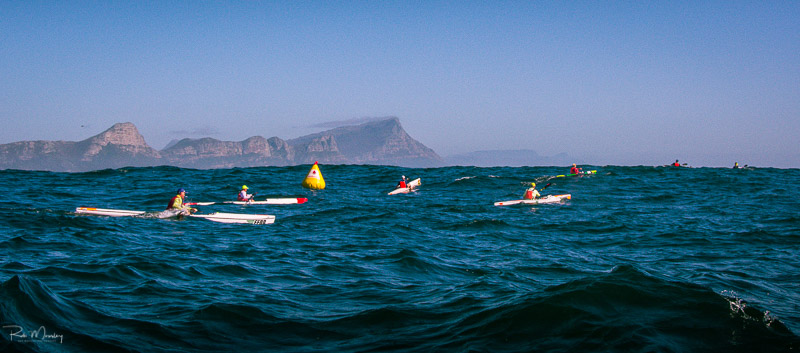
Homeward bound - around the buoy and downwind to Fish Hoek
Cape Point to Fish Hoek
On a good year (and it looks as though 2017 will be such), the run in from the Point to the finish is assisted with a strengthening tail wind. The runs are sometimes initially a little side-on, pushing you left towards Smitswinkel Bay and you need to work right so as not to end up too close in. But the runs from Smits onwards get better and better, and you cover the famous Miller’s Run, favourite of the Fish Hoek downwind paddlers, from Miller’s Point to Fish Hoek.
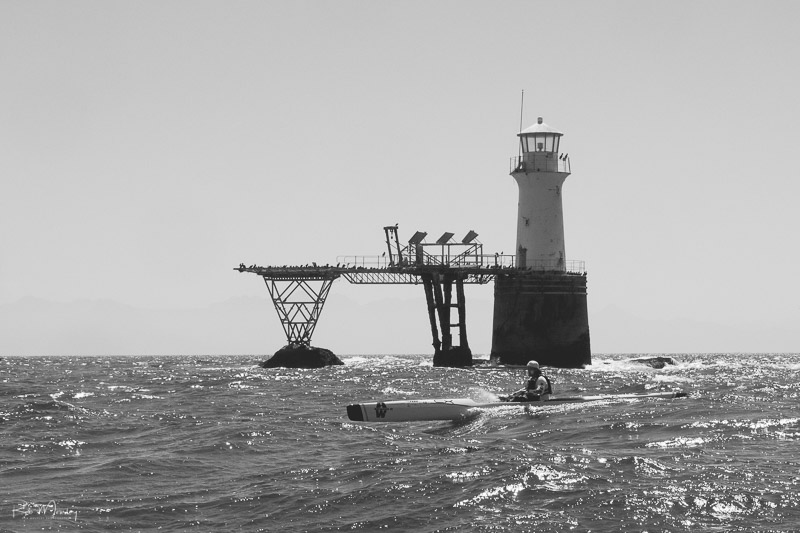
Craig Flanagan passes the iconic Roman Rock lighthouse in False Bay. 5km to go!
You’ll probably end up paddling more like 54km, depending how wide you took Cape Point.
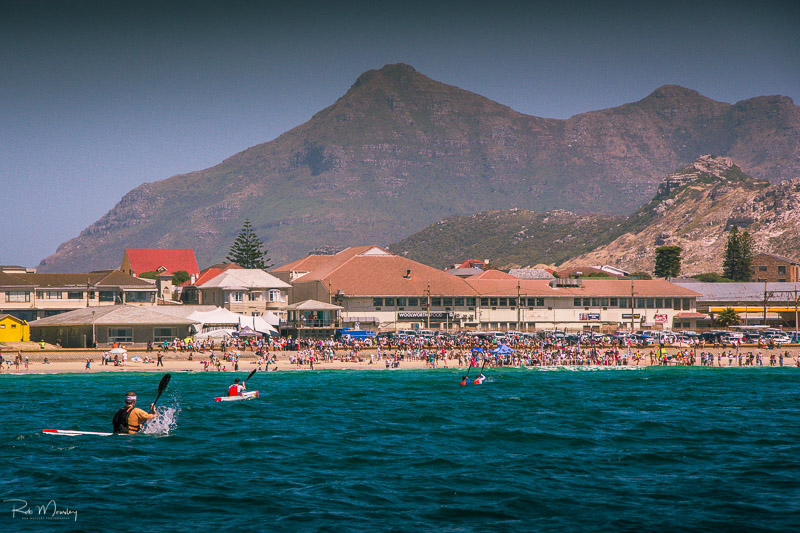
The crowd awaits - and so does an ice cold beer - or three!
So who’s in contention to win this 25th edition?
Hank McGregor has to be a solid favourite: he’s won it no fewer than seven times, for the first time in 2008 and then every year from 2011 onwards. (He's also won the race twice in the doubles category)
Also in the front bunch should be Hank’s Epic Kayaks teammate Jasper Mocke, 2nd last year and in 2015 and Kenny Rice, who’s had a spectacular run in the World Surfski Series this year, winning the Gorge Downwind Champs in the USA and Breizh Ocean Race.
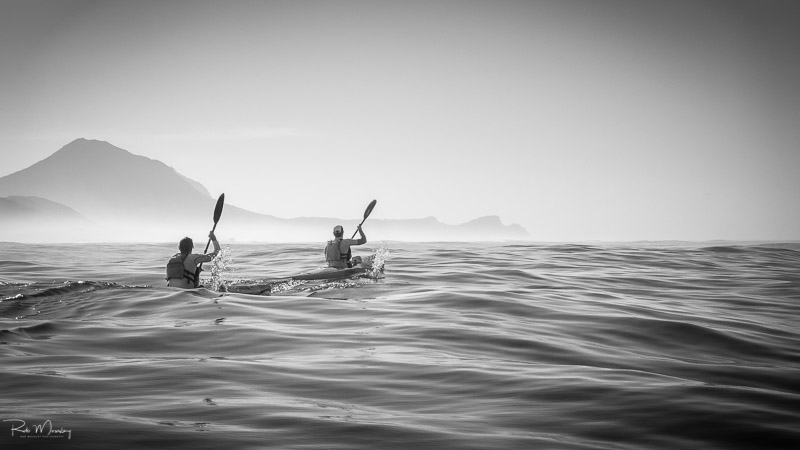
Hank McGregor and Jasper Mocke head towards Cape Point - 2016
Yannick Laousse (France) who’s been raging on the Miller’s Run for the last week came 4th in last year’s Cape Point.
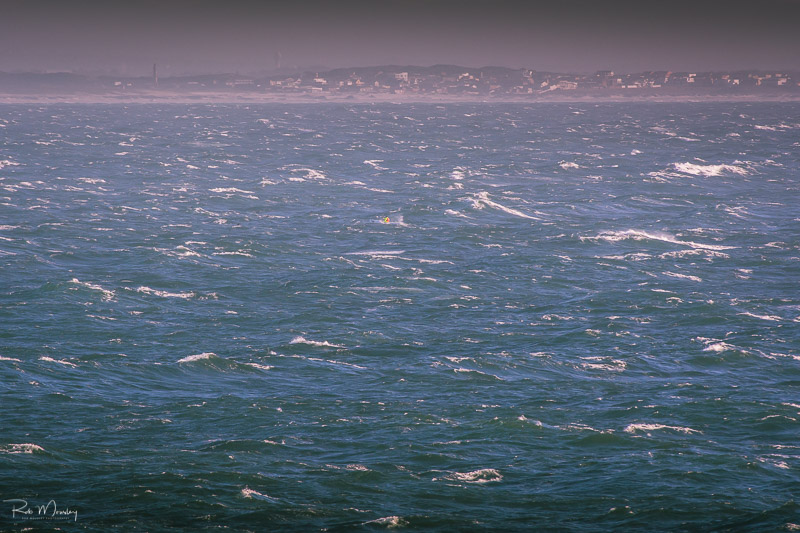
Yannick Laousse - riding the big swells on a Miller's Run a few days ago
Esteban Medina (Spain) came second at EuroChallenge to Sean Rice this year and 4th in the Dutch Coast race.
Noé Pelizza (France) will also be in the front bunch.
Women’s Race
This should be a fascinating race with local favourite Bianca Beavitt up against world-travelling Durban star Hayley Nixon, the newly crowned ICF Ocean Racing World Champion and 2016 World Surfski Series Champion.
Last year Beavitt came second to Nixon by just over two minutes.
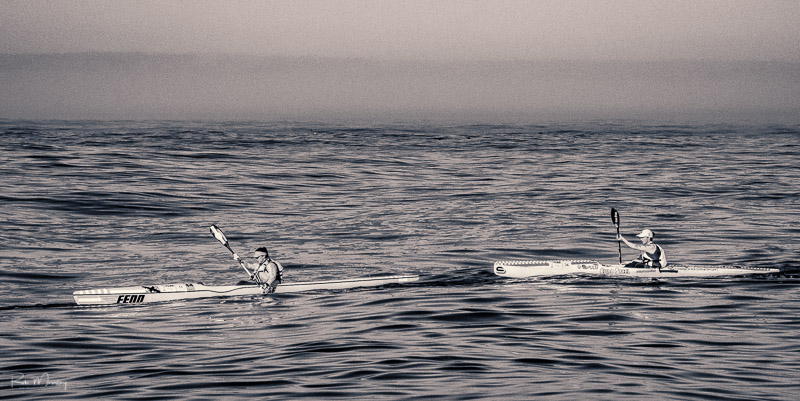
Bianca Beavitt and Hayley Nixon on their way to Cape Point - 2016
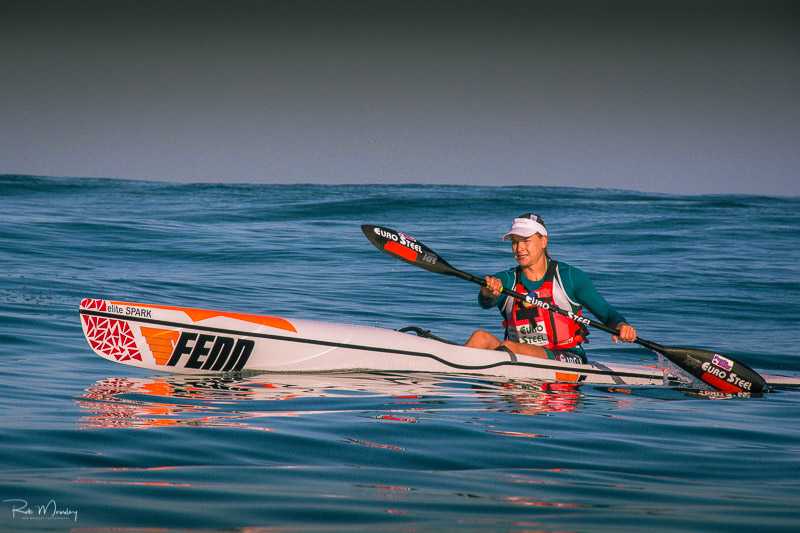
Bridgitte Hartley - 3rd in 2016
Olympian and last year’s third place Bridgitte Hartley will also be at the front of the pack, as will fellow Durbanite Kyeta Purchase.

